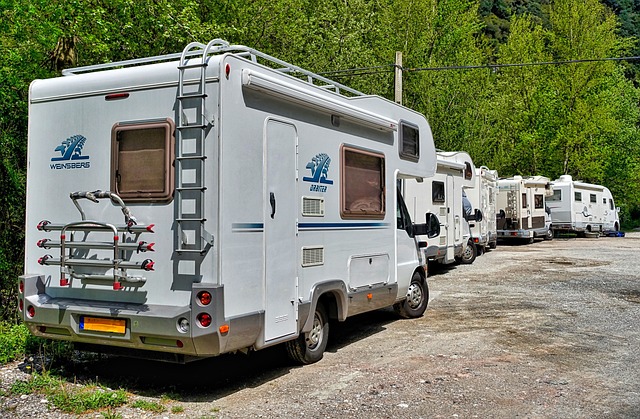If you’ve ever experienced the frustration of your RV AC compressor suddenly shutting off after running for just 2-3 minutes, you’re not alone. I’ve been there, and let me tell you, it’s not the most pleasant situation, especially during those scorching summer trips. But why does your RV AC compressor shut off after 2-3 minutes?
The RV AC compressor shutting off after 2-3 minutes can stem from various causes. Low refrigerant levels due to leaks hinder the system’s pressure, triggering premature shutdown. Malfunctioning thermostats send inaccurate signals, leading to quick cycles. Overheating can result from clogged condenser coils or restricted airflow, prompting the system’s safety mechanisms to halt operation. Electrical problems, like damaged wiring or capacitors, promptly shut off to prevent further damage. Flawed compressor clutch engagement and high ambient temperatures can also contribute to this issue.
But that’s not all, in this article, I’m diving deep into the nitty-gritty of why this happens and what you can do about it.
Understanding the RV AC System:
Before I dive into the intriguing world of why your RV AC compressor seems to have a case of the “2-3 minute shutdown blues,” let’s take a moment to understand the inner workings of your RV’s cooling system. Imagine this as your backstage pass to the cooling concert that keeps you comfortable on your road adventures.
- The Ensemble of Components: Think of your RV AC system as a symphony, with each component playing a unique instrument to create the perfect melody of cool air. The star of the show is the compressor, a bit like the lead vocalist. It’s responsible for pressurizing the refrigerant and getting the cooling process started.
- The Evaporator: Next up, we have the evaporator – your AC system’s magician. It takes that high-pressure refrigerant from the compressor and turns it into a chilly mist. As warm air from your RV flows over the evaporator coils, it’s transformed into refreshing cold air.
- The Condenser: The condenser enters the stage as the supporting actor, but its role is crucial. It takes that now-warm refrigerant vapor from the evaporator and turns it back into a liquid. This process releases heat outside your RV, ensuring the cycle can continue.
- The Refrigerant: The refrigerant is like the VIP guest at the concert. It’s a special chemical that can change from a gas to a liquid and back again at low temperatures. This transformation is what makes the whole cooling magic possible.
In the next section, I’ll explore the potential reasons behind this puzzling phenomenon and arm you with the knowledge to tackle the issue head-on. So, grab your detective hat, and let’s jump into the investigation!
Possible Reasons for AC Compressor Shutting Off
Now that you’ve got your magnifying glasses on and your detective hats firmly in place, let’s start dissecting the mystery of why your trusty RV AC compressor is calling it quits after just a short stint of cooling glory. There could be several culprits lurking backstage, and it’s time to shine a spotlight on each one:
- Low Refrigerant Levels: Imagine your AC system as a thirsty plant and refrigerant as its life-giving water. If the refrigerant levels are running low due to leaks, the compressor might throw in the towel to avoid damage. Those leaks could be sneaking around in various corners of your system, so it’s crucial to plug them up.
- Thermostat Troubles: Ah, the thermostat – the maestro that conducts the entire cooling orchestra. If it’s out of tune or malfunctioning, it might send mixed signals to the compressor. This confusion could lead to the AC shutting off earlier than a fading drumbeat.
- Electrical Gremlins: Electrical hiccups can be like a sudden power outage during a performance. Faulty wiring, worn-out capacitors, or even misbehaving relays might be causing your compressor to throw a dramatic tantrum and exit stage left.
- Overheating Drama: Imagine your AC system sweating like a performer under bright lights. Overheating is a real concern, and it can happen if your condenser coils are blocked or covered in grime. When the system gets too hot, the compressor might make a hasty exit to cool down.
- Compressor Clutch Conundrums: Think of the compressor clutch as the actor who steps onto the stage when it’s their time to shine. If this clutch isn’t engaging or disengaging as it should, the compressor might decide to take an unscheduled intermission.
- High Ambient Temperatures: Even the best performers have their limits. When the temperature outside soars to extreme heights, your AC system might struggle to keep its cool. As a defense mechanism, the compressor might decide to take a break to prevent damage.
- Refrigerant Restrictions: Just as a singer needs space to breathe, your AC system needs proper refrigerant flow. Restrictions in the lines can cause pressure imbalances that lead to shutdowns. Think of it as a clogged vocal cord for your cooling system.
- Dirty Filters and Coils: Imagine trying to sing with a stuffy nose – not easy, right? If your air filters and condenser coils are clogged with dirt and debris, airflow is restricted. This can lead to overheating and, you guessed it, a premature AC shutdown.
In the next act, I’ll walk you through a series of troubleshooting steps that’ll have your RV AC back in the limelight in no time. From checking airflow to inspecting electrical connections, I’ve got you covered. So, stay tuned for the ultimate AC rescue mission!
Troubleshooting Steps
Here are troubleshooting steps that’ll turn you into the star of the show and have that compressor back in the spotlight where it belongs:
- Check Airflow: Think of your AC system as needing room to breathe – the more, the better. Take a look around the condenser and evaporator units. Ensure there are no obstacles like furniture, curtains, or even tall grass outside blocking the airflow. Clear the stage for that cool breeze to flow freely.
- Inspect Thermostat Settings: Head backstage to your thermostat settings. Make sure it’s set to a temperature that should keep your RV comfortable. If your thermostat has gone rogue and is giving you false readings, consider recalibrating it or replacing it altogether.
- Inspect Refrigerant Levels: This is where things get a bit technical. If you suspect low refrigerant levels are the culprit, it’s best to call in the pros. They’ll use their magic tools to measure refrigerant levels and top it up if needed. Remember, refrigerant handling isn’t a DIY concert – it’s best left to the experts.
- Examine Electrical Connections: Grab your toolkit and play electrician for a moment. Inspect all the electrical connections, wires, and capacitors around your AC system. If anything looks frayed, loose, or damaged, tighten or replace them. Safety first, though – make sure to turn off the power before you start tinkering.
- Clean Condenser Coils: Time for a little TLC session. Those condenser coils can get gunked up over time, leading to overheating drama. Gently remove any debris or dirt that’s built up on the coils. A clean stage means a cooler performance.
- Check for Refrigerant Restrictions: Inspect the refrigerant lines for any kinks or restrictions. Think of it as clearing a musician’s path to the stage. If you spot any issues, you might need a technician’s expertise to sort it out.
- Replace Air Filters: Fresh air is key to a great performance, and your AC system agrees. Replace or clean the air filters regularly to ensure proper airflow. It’s a small task with a big impact.
- Monitor Ambient Temperatures: Keep an eye on the temperature outside. If it’s scorching hot, your AC might need a little extra time to keep up. Consider using shades or reflective materials on your RV windows to reduce heat buildup.
While I’m all about DIY spirit, some issues might require a standing ovation from the pros. If you’re not comfortable dealing with electrical components, refrigerant, or complex repairs, it’s a cue to call in the experts.
When to Seek Professional Help
Here’s when it’s time to raise the curtain for the experts:
- Refrigerant Recharge and Leak Detection: If you suspect low refrigerant levels or have noticed a recurring need for recharging, it’s wise to call in a technician. Handling refrigerants requires specialized equipment and knowledge to prevent environmental harm.
- Complex Electrical Repairs: Electrical systems can be tricky terrain, and improper handling can lead to safety hazards or further damage. If you’re dealing with intricate electrical repairs or unfamiliar components, it’s a cue to dial the experts.
- Compressor Replacement: When the heart of your AC system – the compressor – needs replacing, it’s a job best left to professionals. This involves intricate work and specialized tools that an experienced technician can manage effectively.
- Refrigerant Line Repairs: If you suspect restrictions or leaks in the refrigerant lines, it’s a definite red flag. These repairs require a skilled technician who can diagnose the issue accurately and make the necessary repairs without compromising the entire system.
- Evaporator and Condenser Repairs: These components are the backbone of your AC system, and repairing or replacing them requires expertise. Trust a professional to handle these tasks to ensure the integrity of your cooling system.
- Safety Concerns: If you encounter any situation that poses safety risks – be it dealing with high voltage components, refrigerant exposure, or intricate wiring – it’s best to prioritize your safety and let professionals take the reins.
- Persistent Issues: If you’ve followed our troubleshooting steps and the issue persists, it’s a clear sign that something more complex is at play. Don’t let frustration take center stage – instead, call in professionals who can get to the root of the problem.
Remember, inviting professionals onto the stage doesn’t mean you’re bowing out. It’s a smart move to ensure the longevity and optimal performance of your RV’s AC system. Just like a well-coordinated orchestra, a harmonious collaboration between DIY efforts and professional expertise creates the perfect melody of comfort and reliability.
Preventing Future Issues
Congratulations! You’ve tackled the AC compressor mystery and ensured a cool and comfortable journey for your RV adventures. But the show doesn’t end here – it’s time to take the stage as a proactive performer and prevent future encore performances of the “2-3 minute shutdown” drama. Here’s how to keep your cooling system in the spotlight:
- Regular Maintenance is the Key: Just like a musician tuning their instrument before a performance, your AC system needs regular maintenance. Schedule routine check-ups with a professional technician. They can catch potential issues before they escalate into major problems.
- Clean Those Coils: Think of it as giving your AC system a spa day. Regularly clean both the condenser and evaporator coils. A simple wipe-down can prevent airflow blockages and ensure optimal performance.
- Air Filters Are Your Friends: Air filters are like the bouncers at a VIP party – they keep out unwanted guests (dirt and debris). Check and clean or replace them regularly to maintain proper airflow and keep your AC system running smoothly.
- Keep the Area Clear: Give your AC system some space to shine. Make sure the area around the condenser and evaporator units is free from obstructions. This ensures good airflow and helps prevent overheating.
- Shade and Reflect: When parked, consider using shades or reflective materials on your RV windows. This reduces heat buildup inside and lessens the workload on your AC system during scorching outdoor temperatures.
- Be Mindful of Usage: While it’s tempting to crank up the AC full blast all the time, be mindful of its usage. Opt for energy-efficient settings and consider using fans to help circulate cool air.
- Educate and Empower: Share your newfound knowledge with fellow RV enthusiasts. Educating others about proper AC maintenance can help them avoid similar issues and keep the road trip experience enjoyable.
- Listen to Your System: Your RV’s AC system might not have lyrics, but it does communicate through sounds. If you notice any unusual noises or patterns, don’t ignore them. Addressing issues early can save you from bigger headaches down the road.
- Trust the Experts: Remember, there’s no shame in calling in professionals when needed. Sometimes, prevention means relying on those with specialized expertise to keep your AC system in peak condition.
- Document Your Maintenance: Keep a record of maintenance dates, repairs, and any issues you’ve encountered. This can help you track the health of your AC system over time and provide valuable insights for future maintenance.
Conclusion
In conclusion, the RV AC compressor shutting off after 2-3 minutes can be attributed to several potential factors. One common cause is low refrigerant levels, often resulting from leaks in the system, which can trigger the compressor to shut off due to inadequate pressure. Malfunctioning thermostats may also lead to quick cycling, causing the compressor to turn off prematurely.
Additionally, overheating can be caused by blocked condenser coils or restricted airflow, prompting the system’s safety mechanisms to halt operation. Electrical problems such as damaged wiring or capacitors can similarly lead to compressor shutdown as a protective measure. Problems with the compressor clutch engagement and high ambient temperatures may further contribute to this issue.
Addressing these underlying causes through proper maintenance, seeking professional assistance when necessary, and practicing preventive measures can help ensure uninterrupted and efficient cooling during your RV travels.
With your RV’s cooling system working seamlessly, you’re poised to embrace your adventures with a newfound sense of comfort and confidence. So, hit the road with a cool heart and an AC system that’s ready to keep the temperatures just right. Happy travels!
Must read: Here Are The Stationary RV Living Items That You Must Have









